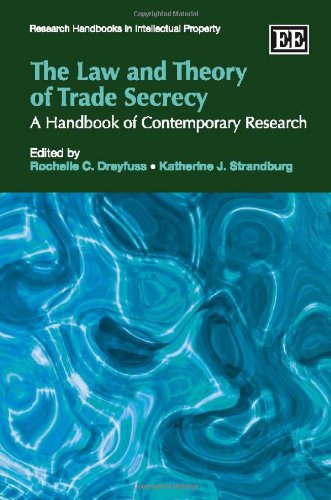

Most ebook files are in PDF format, so you can easily read them using various software such as Foxit Reader or directly on the Google Chrome browser.
Some ebook files are released by publishers in other formats such as .awz, .mobi, .epub, .fb2, etc. You may need to install specific software to read these formats on mobile/PC, such as Calibre.
Please read the tutorial at this link: https://ebookbell.com/faq
We offer FREE conversion to the popular formats you request; however, this may take some time. Therefore, right after payment, please email us, and we will try to provide the service as quickly as possible.
For some exceptional file formats or broken links (if any), please refrain from opening any disputes. Instead, email us first, and we will try to assist within a maximum of 6 hours.
EbookBell Team

0.0
0 reviews'Trade secret law is often seen as the 'Cinderella' of intellectual property law, at least by scholars. But it is hugely important. This volume shows why. Trade secret law provides a window into so many areas of legal thought, and implicates a wide array of public policies. The editors have brought together a diverse set of challenging contributions, which highlight this breadth. Drawing on theory, history, and doctrine, collectively they comprise one of the most wide-ranging and provocative treatments of the field. The volume not only is essential reading for scholars tackling the role of trade secrets in our economy, but also offers important insights for anyone interested in intellectual property law more generally.'
--Graeme B. Dinwoodie, University of Oxford, UK
This timely Handbook marks a major shift in innovation studies, moving the focus of attention from the standard intellectual property regimes of copyright, patent, and trademark, to an exploration of trade secrecy and the laws governing know-how, tacit knowledge, and confidential relationships.
The editors introduce the long tradition of trade secrecy protection and its emerging importance as a focus of scholarly inquiry. The book then presents theoretical, doctrinal, and comparative considerations of the foundations of trade secrecy, before moving on to study the impact of trade secrecy regimes on innovation and on other social values. Coverage includes topics such as sharing norms, expressive interests, culture, politics, competition, health, and the environment.
This important Handbook offers the first modern exploration of trade secrecy law and will strongly appeal to intellectual property academics, and to students and lawyers practicing in the intellectual property area. Professors in competition law, constitutional law and environmental law will also find much to interest them in this book, as will innovation theorists.
Contributors include: R.G. Bone, C.M. Correa, R. Denicola, R.S. Eisenberg, V. Falce, H. First, J.C. Fromer, G. Ghidini, C.T. Graves, M.A. Lemley, D.S. Levine, D.E. Long, M.L. Lyndon, M.J. Madison, F.A. Pasquale, J.H. Reichman, M. Risch, P. Samuelson, S.K. Sandeen, G. Van Overwalle, E. von Hippel, D.L. Zimmerman